The Confidence Gap
Male and Female Mis(Perceptions) of Abilities in Life and Careers and What Can be Done to Address This Persistent Problem in Education and Society
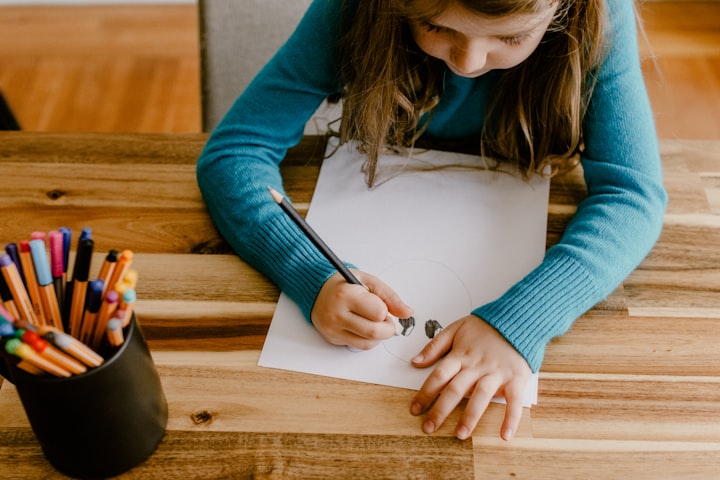
Could you land a plane if the pilot became incapacitated? Could you correctly use the Heimlich maneuver if someone at your table was choking? Could you give CPR if one of your friends, coworkers, or family members suddenly went into cardiac arrest? A recent study found that men were far more confident than women in their abilities - even if they lacked them - to do such critical tasks. We explore this “confidence gap” and how it translates into challenges - and opportunities - to build self-reliance in women, from school to career.

Introduction
It was one of those statistics that you read, and that newfound knowledge causes you to either jump out of your seat and/or spit coffee on your device to start your day off in a baaaaaaaaad way!

Here’s what nearly put my iPad at extreme risk just the other day. The study I was looking at was a short, simple one. It asked respondents a total of just three questions. But it had a rather unique opening question: If they were on an airliner and a flight attendant came on the intercom and asked if anyone on board knew how to fly a plane (echoing the plot of many a movie and TV show), would you step up and think that you were the one person that could save the day? Well, a recent survey found that a third of Americans thought that they could do so! But that was not the real headline number. No, the real headline was that half - half of all men - believed that they could, in fact, land the plane without having any pilot training. Overconfident much?
The details of the study in question are that YouGov, a leading marketing data analysis company, recently asked a survey of over 20,000 Americans about their confidence level to be able to take successful actions in three critical, life-saving situations - without any training and/or preparation to do so. These three scenarios were:
- Being able to safely land the airplane if the pilot became incapacitated;
- Being able to successfully apply the Heimlich maneuver if someone was choking; and
- Being able to correctly use CPR (Cardiopulmonary resuscitation) to resuscitate someone who has experienced a cardiac arrest.

In this article, we’re going to take the results of the YouGov survey and explore the really interesting things they found out about the male mind today - and yes, I’m writing this article not from the “distaff side” of the societal equation, but from the so-labeled “spear side” of things. We’ll put YouGov’s survey findings into a larger context, examining the larger issue of the “confidence gap” that exists between males and females in our society. This is a gap that reveals itself from the time girls first enter formal education and persists into adulthood, impacting women’s careers, achievements, and, yes, their lives through the mental health consequences that the confidence gap has on half of our society. To conclude this article, we will look at some ideas out there to help minimize or even eliminate the confidence gap that women face and produce better outcomes for all.

The YouGov Study: Exhibit A of the Confidence Gap between Men and Women
In 2023, YouGov surveyed a representative sample of 20,063 Americans on the three questions mentioned above. As hinted at in our opening, their findings were a bit surprising - but should they be, considering the very real, very persistent confidence gap that exists between men and women in our society?

Landing the Plane
The first question that the YouGov researchers asked their survey pool was this:
“How confident are you that you could safely land a passenger airplane in an emergency situation, relying only on the assistance of air traffic control?”
Figure 1: YouGov - All Adults Confidence That They Could Safely Land a Plane in an Emergency
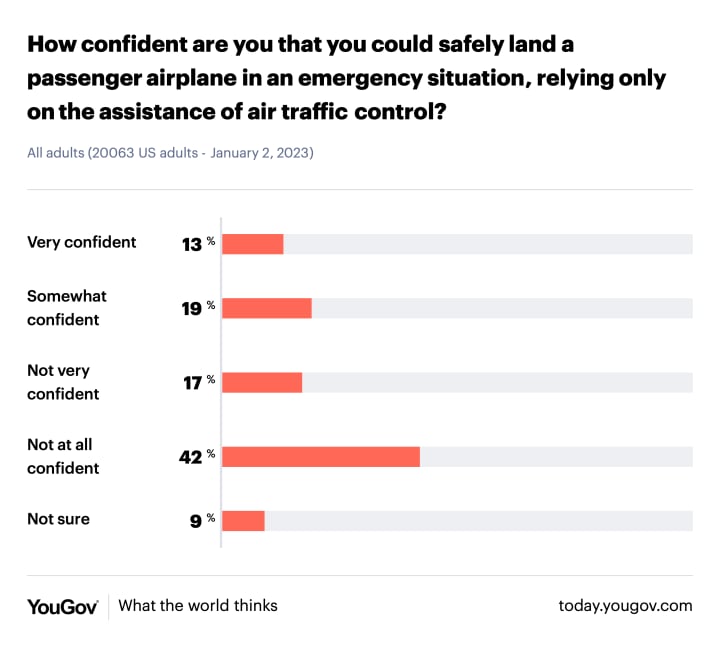
Source: YouGov, https://today.yougov.com/topics/politics/survey-results/daily/2023/01/02/fd798/3 (Used with Permission)
As you can see in Figure 1 (YouGov - All Adults Confidence That They Could Safely Land a Plane in an Emergency) above, almost a third of all Americans - 32% - were either very or somewhat confident that they would be able to land the plane safely. Now, notwithstanding movies like “Airplane!” where a male passenger (an ex-military pilot) did famously - and hilariously - manage to land the plane safely when the entire crew became incapacitated from food poisoning…
… and a few real incidents where a passenger has been able to land a small private plane with the help of air traffic controllers when the pilot fell unconscious…
…expert pilots point to just how difficult a task landing a plane “safely” - maybe not intact, but in a survivable crash landing, is an extremely difficult task.
Heck, even the “MythBusters” demonstrated just how hard this is to do in reality, even with all the autopilot technology on board aircraft today.
But….the real headline and coffee-spitting numbers came when you dug into the survey just a bit, revealing “Exhibit A” of the very real confidence gap that exists - and persists - between men and women. Take a look at Table 1 (YouGov - Gender-based Differences in Adults Confidence That They Could Safely Land a Plane in an Emergency) below. As you can see, men were almost three times more likely (20% vs. 7%) to be “very confident” that they could indeed land the plane safely in such an incident. Likewise, male respondents were twice as likely (26% vs. 13%) to be at least “somewhat confident” that they could land the plane than their female counterparts. Finally, while 42% of all Americans said that they were “not at all confident” that they could successfully pull off landing the plane without a pilot on board, take a look at the flip side of the confidence gap. While arguably, pilots and other experts would argue that not having confidence in one’s abilities to do this would be the “right” answer to the survey question, note that almost double the number of women (55%) said they weren’t confident in their abilities to do so, compared with just 28% of men! Yes, this one survey question from this one study does encapsulate the confidence gap between women and men quite well!
Table 1: YouGov - Gender-based Differences in Adults Confidence That They Could Safely Land a Plane in an Emergency
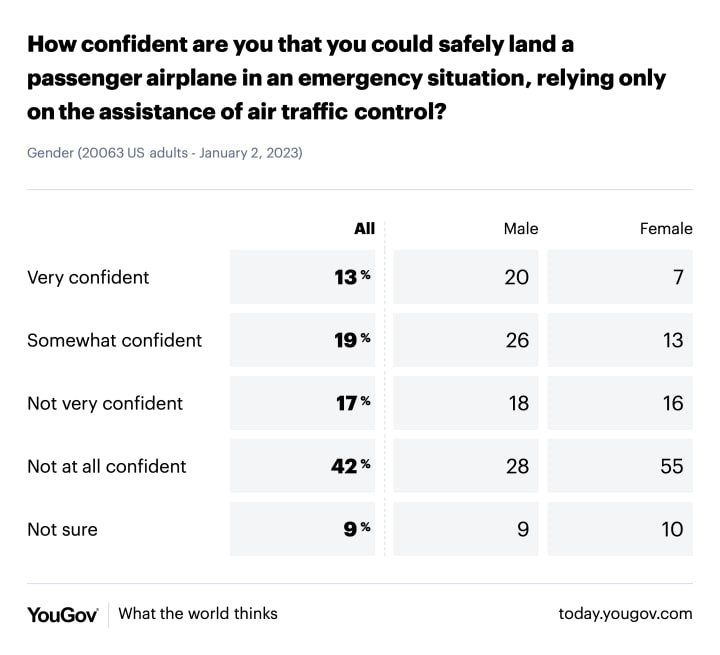
Source: YouGov, https://today.yougov.com/topics/politics/survey-results/daily/2023/01/02/fd798/3 (Used with Permission)
Consider also that there really wasn’t a similar confidence gap to be found in digging further into the YouGov survey results based on age (see Figure 2 [YouGov - Age-based Differences in Adults Confidence That They Could Safely Land a Plane in an Emergency]), ...
Figure 2: YouGov - Age-based Differences in Adults Confidence That They Could Safely Land a Plane in an Emergency
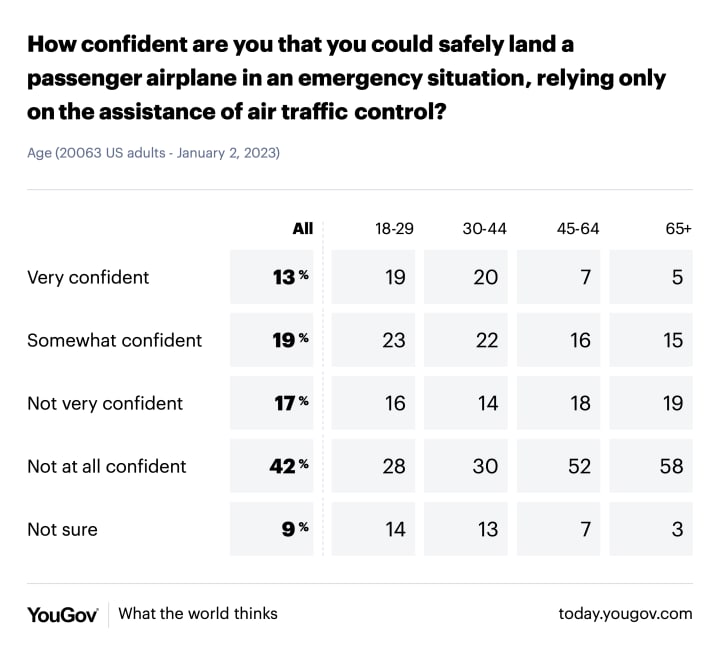
Source: YouGov, https://today.yougov.com/topics/politics/survey-results/daily/2023/01/02/fd798/3 (Used with Permission)
… race (see Figure 3 [YouGov - Race-based Differences in Adults Confidence That They Could Safely Land a Plane in an Emergency]),...
Figure 3: YouGov - Race-based Differences in Adults Confidence That They Could Safely Land a Plane in an Emergency
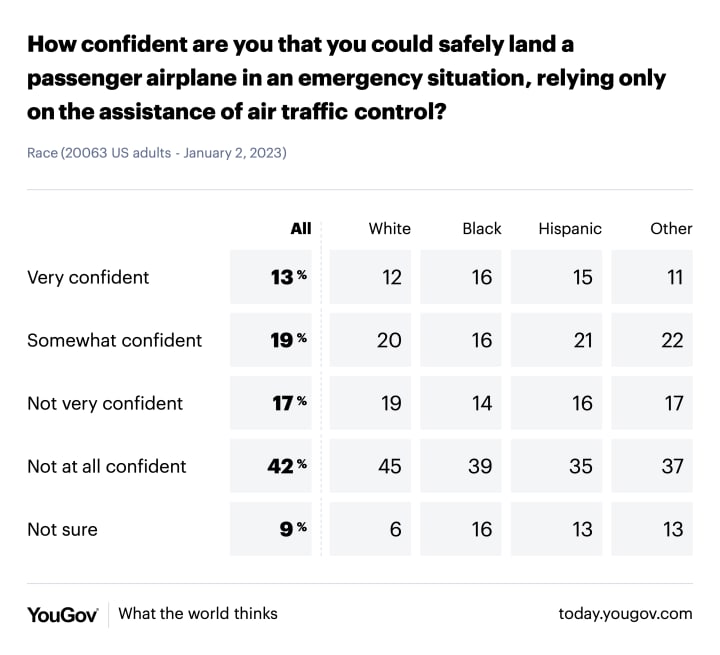
Source: YouGov, https://today.yougov.com/topics/politics/survey-results/daily/2023/01/02/fd798/3 (Used with Permission)
… or even one’s political leanings (Figure 4 [YouGov - Differences in Adults Confidence That They Could Safely Land a Plane in an Emergency Based on Differing Political Outlooks]).
Figure 4: YouGov - Differences in Adults Confidence That They Could Safely Land a Plane in an Emergency Based on Differing Political Outlooks
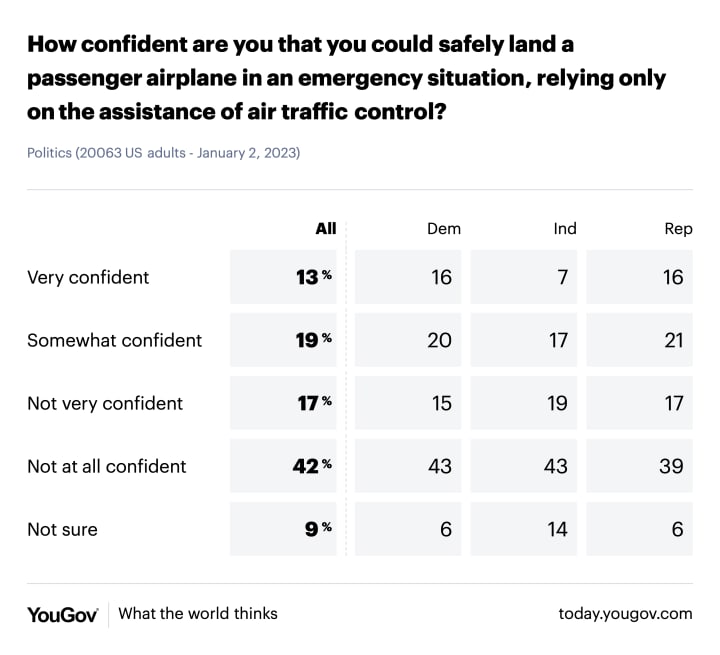
Source: YouGov, https://today.yougov.com/topics/politics/survey-results/daily/2023/01/02/fd798/3 (Used with Permission)
Thus, one’s gender was the only demographic factor that differentiated Americans in their belief that they could do what the experts would argue would be an extremely difficult task in landing the aircraft safely without the aid of a pilot on board. Overwhelmingly, males were far more confident - and less unconfident - in their abilities to successfully land the plane in this scenario than females, and the differences observed between men and women in this study's cohort were far more than what was found by the YouGov researchers based on any other demographic variable.
Executing the Heimlich Maneuver
Further evidence of the confidence gap between male and female Americans could be found in the other two questions that the YouGov research team asked of its nationwide survey pool. The second question that the YouGov researchers asked their survey pool was this:
“How confident, if at all, are you that you could perform the Heimlich maneuver if needed to free the airway of someone who is choking?”
Figure 5: YouGov - All Adults Confidence That They Could Successfully Apply the Heimlich Maneuver in a Choking Emergency
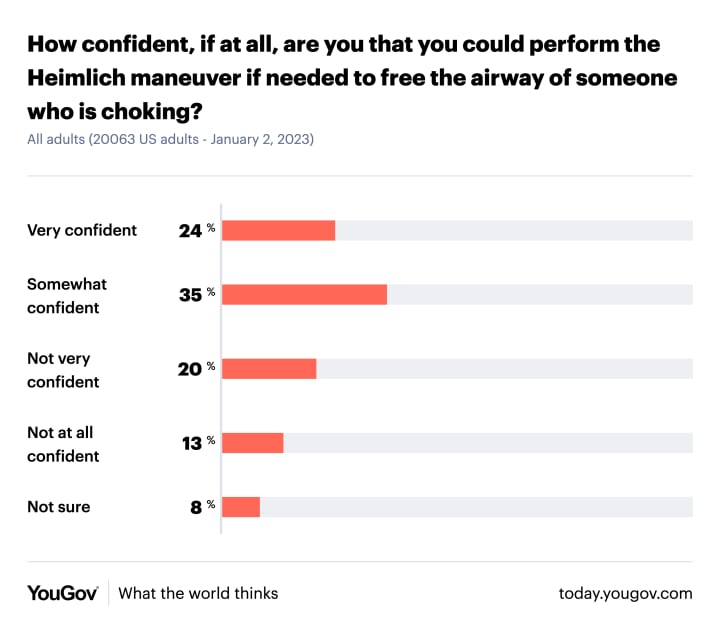
Source: YouGov, https://today.yougov.com/topics/politics/survey-results/daily/2023/01/02/fd798/2(Used with Permission)
As you can see in Figure 5 (YouGov - All Adults Confidence That They Could Successfully Apply the Heimlich Maneuver in a Choking Emergency), Americans overall expressed a surprising level of confidence that they could save a friend, family member, or even a stranger from choking by applying this life-saving technique. Fully 59% of all Americans said that they were confident that they could use the Heimlich maneuver, with only a third of those surveyed saying that they weren’t confident in their abilities to do so. Once again, there were no real significant differences to be found between Americans’ answers to this question based on demographic variables - except for gender.
Take a look at Figure 6 (YouGov - Gender-based Differences in Confidence That They Could Successfully Apply the Heimlich Maneuver in a Choking Emergency) below. Yes, men were two-thirds more likely to say that they were “very confident” in their abilities to successfully save someone from choking. However, the other part of the confidence gap here between men and women is on the flip side. Male respondents were far less likely to say that they were not confident in their ability to successfully make use of the Heimlich maneuver in an emergency situation. Only 9% of men said that they were “not at all confident” in their ability in this area (compared to 17% of women), and likewise, 16% of males said they were “not very confident” that they could apply the Heimlich maneuver (compared to 23% of women).
Figure 6: YouGov - Gender-based Differences in Confidence That They Could Successfully Apply the Heimlich Maneuver in a Choking Emergency
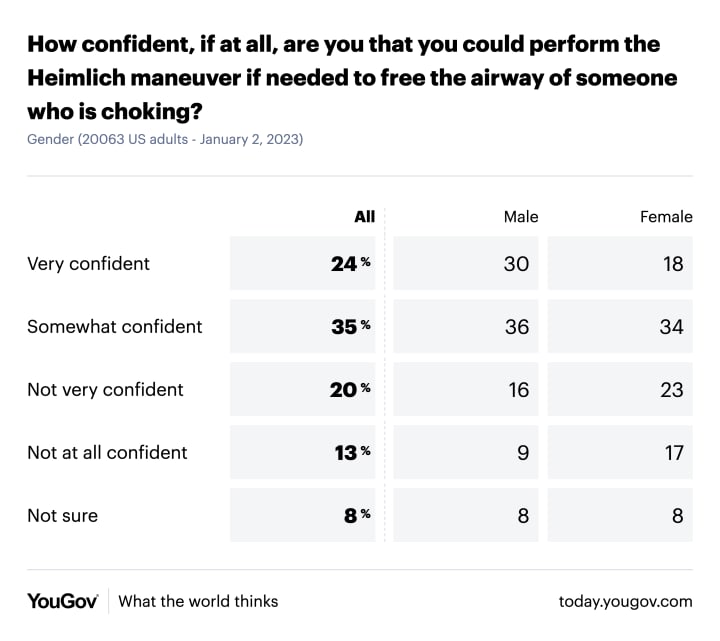
Source: YouGov, https://today.yougov.com/topics/politics/survey-results/daily/2023/01/02/fd798/2 (Used with Permission)
Administering CPR
The third and final question that the YouGov researchers asked their survey pool was this:
“How confident, if at all, are you that you could perform CPR if needed to revive someone whose heart had stopped beating?”
Figure 7: YouGov - All Adults Confidence That They Could Correctly Use CPR to Resuscitate Someone Who Has Experienced a Cardiac Arrest
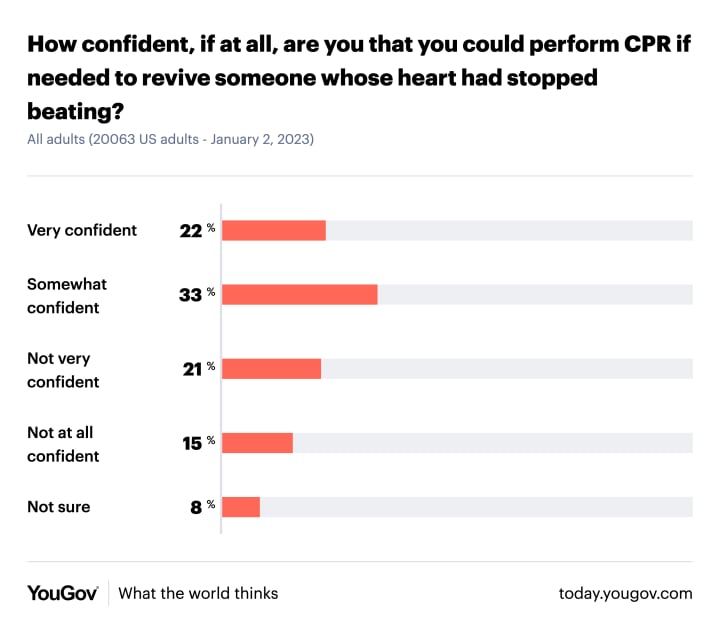
Source: YouGov, https://today.yougov.com/topics/politics/survey-results/daily/2023/01/02/fd798/1 (Used with Permission)
As you can see in Figure 7 (YouGov - All Adults Confidence That They Could Correctly Use CPR to Resuscitate Someone Who Has Experienced a Cardiac Arrest) above, once again, over half of all Americans said that they were “very” or “somewhat” confident that they could do CPR correctly if someone was having a cardiac arrest (so, make sure that you have the right person around you if you have a heart attack!).
Once again, similar to the numbers involving another health emergency, while half of all Americans were confident in their CPR abilities, approximately a third expressed their lack of confidence with this lifesaving first-aid technique. However, Figure 8 (YouGov - Gender-based Differences in Confidence That They Could Correctly Use CPR to Resuscitate Someone Who Has Experienced a Cardiac Arrest), shows that once again, men were far more confident in their capacity to use cardiopulmonary resuscitation in a health emergency and far less likely to say that they weren’t confident in their CPR abilities than were women. And once again, the subject's gender was the only differentiating demographic variable (not race, not age, not political affiliation) to demonstrate a real difference in Americans’ self-confidence in their ability to provide lifesaving first-aid in the form of CPR.
Figure 8: YouGov - Gender-based Differences in Confidence That They Could Correctly Use CPR to Resuscitate Someone Who Has Experienced a Cardiac Arrest
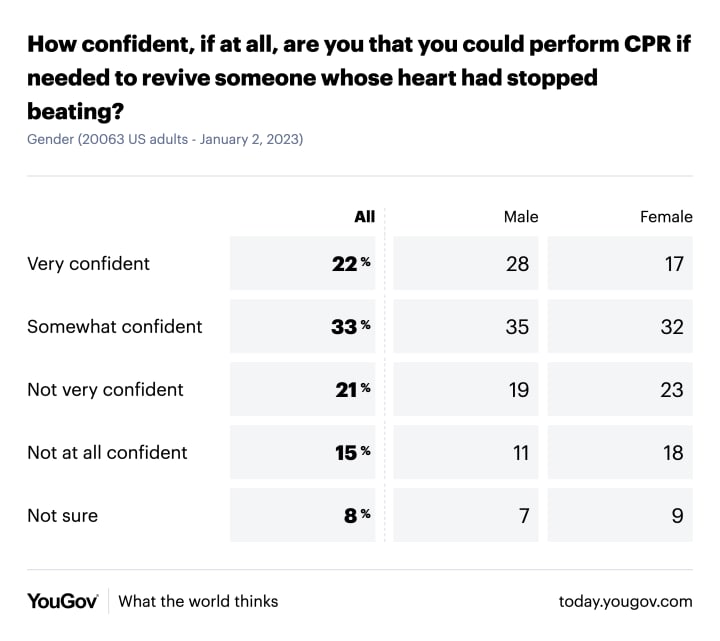
Source: YouGov, https://today.yougov.com/topics/politics/survey-results/daily/2023/01/02/fd798/1 (Used with Permission)
Summary
On the whole, the YouGov research study made for interesting fodder for conversations with coworkers in the office or with college students in the classroom. And while all three questions dealt with serious, extreme situations, one could argue that all are realistic scenarios - especially the two health emergencies. Indeed, health advocates continue to try and get more Americans to learn both the Heimlich maneuver and CPR - and to have this education refreshed regularly - “just in case!” The eye-popping, possibly coffee-spitting findings from the YouGov survey came in the form of the confidence gap that this study shows between men and women in our society - a gap that is both well-documented - and persistent.

The Confidence Gap
Indeed, there is an undisputed, well-known confidence gap between men and women that impacts many aspects of life, including career advancement, personal relationships, and overall satisfaction. Studies have shown that women tend to underestimate their abilities and be more self-critical than men, even when they are equally qualified for a job or task. This can lead to missed opportunities and a lack of assertiveness. However, there are ways to overcome this gap, and today, more and more educators and employers are recognizing that they have a role in directly addressing the confidence gap we see between men and women, as we see the confidence gap throughout women’s lives, from early schooling through the college years and into one’s career.
How the Confidence Gap Reveals Itself Early in Life
The confidence gap shows up early in life, and it can greatly impact young women's performance in schools. Indeed, studies have shown that girls tend to have lower confidence levels than boys, which can affect their academic achievement. Studies have shown that girls tend to underestimate their abilities and be more self-critical than boys, even when they perform equally well academically. This can lead to girls being less likely to participate in class, ask for help when they need it, or take on leadership roles in extracurricular activities. Young girls may believe that they have less ability to tackle “hard” subjects like math or science.
How the Confidence Gap Impacts Women in Their College Years
The confidence gap really tends to have a significant impact on women in their college years. It can affect their academic performance, career aspirations, and overall well-being. Women may be less likely to participate in class discussions, seek help from professors, or apply for competitive programs, internships, or scholarships because they underestimate their abilities or fear failure. This can lead to missed opportunities and lower self-esteem. Additionally, women may be less likely to pursue majors or careers in fields that are traditionally male-dominated, such as science, technology, engineering, and mathematics (STEM).
How the Confidence Gap Impacts Women in Their Careers
Over time, the confidence gap that we see between males and females in our society tends to have a very real and significant impact on women's careers. The gap can lead to missed opportunities for career advancement, lower salaries, and less recognition for their accomplishments. Women may be less likely to apply for jobs or promotions they are qualified for because they underestimate their abilities or fear failure. They may also struggle with speaking up and asserting themselves in the workplace, which can make it difficult to advocate for their ideas. Additionally, they may be less assertive in negotiating salaries or advocating for themselves in the workplace. This can result in women being underrepresented in leadership positions and not reaching their full potential in their careers.
How the Confidence Gap Impacts Women in Their Lives Overall
The confidence gap can impact many aspects of women's lives, including their educational aspirations and attainment, career advancement, personal relationships, and overall life satisfaction. Women may be less likely to take risks, set ambitious goals, or advocate for themselves in various situations, such as at work or in their personal lives. This is because they underestimate their abilities and/or fear failure. This can lead to missed opportunities, unfulfilled potential, and lower self-esteem. Additionally, women may experience higher levels of stress, anxiety, and depression because of the constant self-doubt and self-criticism that can result from the confidence gap.

Recommendations
In the end, the findings from this YouGov study should be seen as not just an eye-opener, but a call to action. It is essential that we, as a society, take steps to address the confidence gap that women face today - both early and throughout women’s lives. Addressing the confidence gap involves building self-awareness, seeking feedback, and practicing self-compassion. It's essential for women to recognize the value of their skills and accomplishments and to believe in themselves and their potential.
There are several steps that can be taken to improve the confidence of young girls:
1. Encourage them to try new things: Encouraging young girls to try new things and take risks can help build their confidence. This can be done by exposing them to different activities, hobbies, and experiences.
2. Praise effort over outcome: Praising effort over outcome can help young girls develop a growth mindset, which is essential for building confidence. This means praising them for their hard work, persistence, and resilience, rather than just their achievements.
3. Provide positive feedback: Providing positive feedback can help young girls feel good about themselves and their abilities. This can be done by acknowledging their strengths, progress, and accomplishments.
4. Create a supportive environment: Creating a supportive environment that encourages young girls to be themselves and express their opinions can help build their confidence. This can be done by listening to them, validating their feelings, and providing opportunities for them to take on leadership roles.
5. Teach self-compassion: Teaching young girls to be kind to themselves and practice self-compassion can help them overcome self-doubt and build resilience. This means helping them to reframe negative self-talk and treat themselves with the same kindness and understanding they would offer to a friend.

However, addressing the confidence gap is not something that should only be focused upon just in the primary, secondary, and even post-secondary education settings. Rather, there are a number of moves that both women themselves and employers - through training and development and mental health outreach efforts for not just their female employees, but for all their workers - can take to improve the self-confidence of women in their adult years, no matter their age:
1. Practice self-care: Taking care of yourself physically, mentally, and emotionally can help boost your confidence. This can include things like getting enough sleep, eating a healthy diet, exercising regularly, and practicing relaxation techniques like deep breathing or meditation.
2. Challenge negative self-talk: Pay attention to the things you say to yourself and challenge negative thoughts or beliefs. Instead of focusing on your flaws, try to focus on your strengths and accomplishments.
3. Set achievable goals: Setting goals and working towards them can help build confidence as you achieve success. Make sure your goals are realistic and achievable, and break them down into smaller steps if necessary.
4. Surround yourself with positivity: Surround yourself with people who uplift and support you. Avoid toxic relationships and negative influences.
5. Learn new skills: Learning new skills or taking on new challenges can help build confidence as you develop new abilities and knowledge.
6. Practice assertiveness: Assertiveness involves standing up for yourself and expressing your opinions and needs in a respectful way. Practice being assertive in situations where you feel uncomfortable or unsure.
7. Celebrate successes: All of us, both women and men, should take time to celebrate their successes, no matter how small they may seem. This can help build confidence and motivation to continue striving towards your goals.

In the end, taking steps - both individually and collectively - to directly address this very real confidence gap that exists between women and men will benefit us all. And yes, the time to start is today!
++++++++++++++++++++++++++++++++

About David Wyld
David C. Wyld is a Professor of Strategic Management at Southeastern Louisiana University in Hammond, Louisiana. He is a management consultant, researcher/writer, publisher, executive educator, and experienced expert witness. You can view all of his work at https://authory.com/DavidWyld. You can subscribe to his Medium article feed at: https://davidwyld.medium.com/subscribe.
Social Media Links to David Wyld:
* on Facebook
* on LinkedIn
* on Threads
* on Twitter (X)
About the Creator
David Wyld
Professor, Consultant, Doer. Founder/Publisher of The IDEA Publishing (http://www.theideapublishing.com/) & Modern Business Press (http://www.modernbusinesspress.com)






Comments (1)
Agreed and women can do anything men can do. Happy New Year!